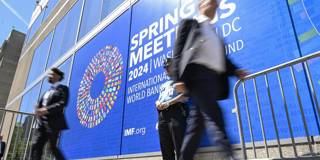The World Bank’s Board of Executive Directors recently approved a groundbreaking Framework for Financial Incentives to encourage investments in projects that generate positive cross-border externalities. It is an important step toward making the Bank’s financial model fit for “ending poverty on a livable planet.”
WASHINGTON, DC – We are two of the 25 members of the World Bank’s Board of Executive Directors, which collectively represents 189 member countries with divergent interests. So, in addition to holding management accountable, we perform the difficult balancing act of building global consensus on a day-to-day basis. When members see eye to eye, the World Bank is a global public good (GPG) – one of the few places where all countries can strive to find common ground.
But ever since the Bank launched its recent reform process in late 2022, divisions between the Global North and Global South have threatened to weaken an organization accustomed to decision-making by consensus. The main point of contention is how, given scarce development finance, the World Bank can help countries eradicate poverty, boost shared prosperity, and protect their people and natural assets from transboundary crises such as climate change and pandemics. After all, there cannot be one (poverty eradication and shared prosperity) without the other (protection of the global commons) – it must be all or nothing.
Nevertheless, we made important progress: a new vision and mission, a redesigned corporate scorecard, $50 billion in new lending capacity, innovative new funding instruments for raising additional donor contributions, an expanded crisis toolkit (including climate-resilient debt clauses), and a new approach to creating and disseminating knowledge.

WASHINGTON, DC – We are two of the 25 members of the World Bank’s Board of Executive Directors, which collectively represents 189 member countries with divergent interests. So, in addition to holding management accountable, we perform the difficult balancing act of building global consensus on a day-to-day basis. When members see eye to eye, the World Bank is a global public good (GPG) – one of the few places where all countries can strive to find common ground.
But ever since the Bank launched its recent reform process in late 2022, divisions between the Global North and Global South have threatened to weaken an organization accustomed to decision-making by consensus. The main point of contention is how, given scarce development finance, the World Bank can help countries eradicate poverty, boost shared prosperity, and protect their people and natural assets from transboundary crises such as climate change and pandemics. After all, there cannot be one (poverty eradication and shared prosperity) without the other (protection of the global commons) – it must be all or nothing.
Nevertheless, we made important progress: a new vision and mission, a redesigned corporate scorecard, $50 billion in new lending capacity, innovative new funding instruments for raising additional donor contributions, an expanded crisis toolkit (including climate-resilient debt clauses), and a new approach to creating and disseminating knowledge.